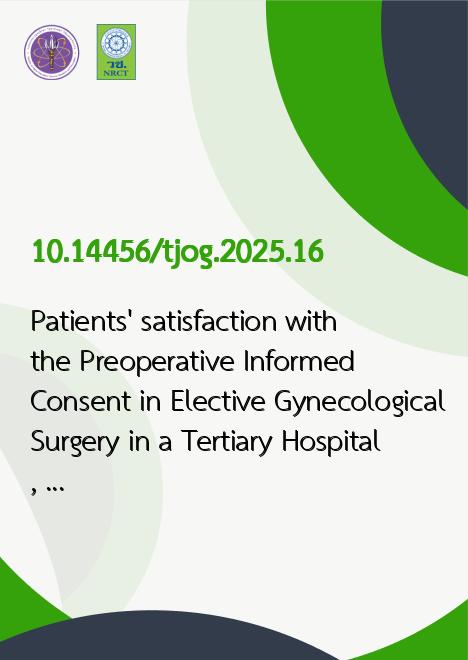
|
Patients' satisfaction with the Preoperative Informed Consent in Elective Gynecological Surgery in a Tertiary Hospital, BMA |
|---|---|
| รหัสดีโอไอ | |
| Creator | Thossaporn Chuaysatit |
| Title | Patients' satisfaction with the Preoperative Informed Consent in Elective Gynecological Surgery in a Tertiary Hospital, BMA |
| Contributor | Apichaya Pradyachaipimol, Jiraporn Luengmettakul |
| Publisher | PIMDEE Co., Ltd. |
| Publication Year | 2568 |
| Journal Title | Thai Journal of Obstetrics and Gynaecology |
| Journal Vol. | 33 |
| Journal No. | 2 |
| Page no. | 148-160 |
| Keyword | patients satisfaction, decisional satisfaction scale, informed-consent process' elective gynecological surgery |
| URL Website | https://tci-thaijo.org/index.php/tjog/index |
| Website title | www.tci-thaijo.org |
| ISSN | 2673-0871 |
| Abstract | Objectives: This study aimed to evaluate patients satisfaction with the preoperative informed consent process in elective gynecological surgery.Materials and Methods: This cross-sectional study was conducted at Charoenkrung Pracharak Hospital, Bangkok, Thailand, from October 2023 to May 2024. Personal data and satisfaction with the preoperative informed consent process were collected on the second postoperative day. The Thai version of the decisional satisfaction scale (DSS) was used to measure satisfaction and the informed consent process questionnaire was used to assess knowledge of surgery and perception of informed consent process. Bivariate associations between highly satisfied and not highly satisfied groups were tested using Fisher s exact test. Results: A total of 178 participants were enrolled, with a mean age of 42.48 years. Most participants agreed or strongly agreed with the statements on the DSS, a mean total score was 27.87, indicating high overall satisfaction. One hundred and thirty-five patients (75.8%) were highly satisfied with the informed consent process. There were several factors with significant differences between the highly satisfied group and not highly satisfied group. These included being informed about the consequences of not undergoing the procedure, knowing enough about the procedure to explain it, being informed about the reasons for prolonged urine catheterization and being given the opportunity to refuse the procedure. Conclusion: This study highlighted the critical role of an effective informed consent process in elective gynecological surgery. High patient satisfaction was achieved when communication and patient participation were prioritized. Future research should explore these dynamics in different settings and diverse populations. |
